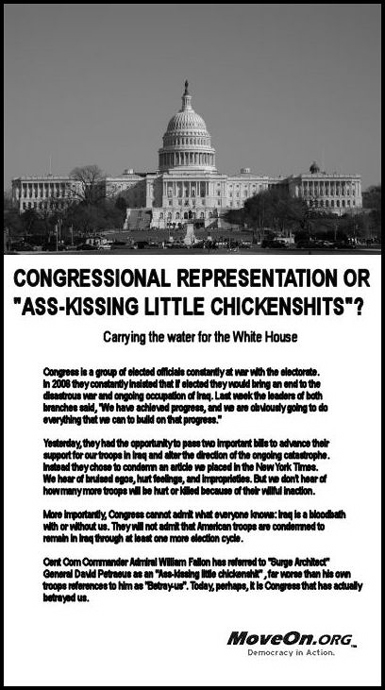 General William Westmoreland, a 1960s era Petraeus
General William Westmoreland, a 1960s era PetraeusWhen Bush launched the Iraq invasion, it was common for war opponents to warn: "this is going to be Vietnam on steroids." And it was, in the sense that, just like the Vietnamese, Iraqis didn't take kindly to being occupied by huge foreigners, swathed in modern armor, unconstrained in their use of violence, who knew nothing of their history, religion, cultures or language.
Unlike the Vietnamese, the Iraqi resistance does not have a popular, widely legitimate, leadership. But the U.S. invasion has empowered various groups to fight and manipulate the occupier while concurrently taking aim at each other. The "Vietnam on steroids" metaphor had diminished currency as the Iraqi civil war took center stage.
Lately our rulers have revived the metaphor for their own purposes, not only in Bush's absurd effort to pump up the "stab in the back" myth about our lost Indochina war, but also by trotting out an ambitious, television-savvy general to try to sell continued mayhem to a weary public.
What will happen in Iraq will happen. The U.S. has lost that war and will eventually get out; the Iraqis will make us leave -- here in the U.S.,
most of us see no point in getting more of our young people killed.
Democratic would-be Presidents can dither all they want. What do they mean by withdraw all "combat" troops? Any troops they leave in Iraq who aren't "combat" troops will rapidly become dead bodies. All of this discussion is irrelevant -- the Iraqis will eventually boot us out of their destroyed country.
Where it is important to look at the "Vietnam on steroids" metaphor today is on the home front. Wars, especially failed imperial wars, have consequences -- this one, in addition to exposing the fragility of our economic system as the United States government goes further in hock to China to pay for it, is changing our political culture in ways reminiscent of Vietnam.
Because the Iraq invasion is so closely identified with a President who controlled both houses of Congress and whose legitimacy was quite fragile aside from posturing as a permanent "Commander in Chief," disgust about the war has been a huge spur to Democratic Party activism. After all, it was the Republicans who gave us this mess -- so in a two-party system, opponents naturally run over to build up the other guys.
Concurrently, since the mainstream media were complicit in the lies that got us into war and the internet was changing where some people meet and organize, the war spawned a lively Democratic netroots which became a major arena for expression of antiwar energy. So we've got Daily Kos and a plethora of other sites.
From the new Democratic netroots, a generation of people who hadn't paid much prior attention to politics cut their teeth in Democratic campaigns, both losing (Dean, Lamont...) and winning (Congress 2006) and pinned their hopes on a Democratic ascendancy.
As they watch Democrats in Congress
waffle on refusing to fund the war, they are learning bitterly what a previous generation of anti-Vietnam activists never had a choice about knowing because Vietnam was Democratic President Lyndon Johnson's war: Democratic party elites share with Republicans a confidence that the United States can and should rule the world. Listen to smart electoral wonk Chris Bowers at
Open Left: ... if Democrats end up nominating a candidate who supports a substantial residual forces plan while thinking that candidate will actually withdraw virtually all troops in a short period of time, then basically our party will have been hoodwinked in a manner not unlike the way the war was first sold to the American public back in 2002 and 2003. While that will be incredibly depressing and infuriating, it also won’t be that much of a huge surprise. After all, most of the Democratic foreign policy elite behind the substantial residual forces plan actually helped sell the Iraq war before it began.
He also labels the Democratic presidential offerings "Hillary Edwama."
At this moment, the phrase that "Iraq is Vietnam on steroids" applies all too easily to the developing alienation from electoral struggle among many of the most committed, competent and effective activists brought forward by this generation's war. That is exactly what Vietnam did among a previous generation of activists. Get involved with Democrats? No way!
I'm not going to argue that playing in party politics is good for the soul. It is not. But I do know what happens when progressive activists walk away in disgust from this noxious arena. Activists from the Vietnam generation know -- because many of us already did that. The result was that the Boomers now in office are not the people from the vigorous movements, the creative sectors, of that era's popular struggles. Our generation's pols are the cautious, the amoral, the careerists, the hustling ladder climbers. (Sound like any Clintons you know?)
If Democrats' adoption of Bush's war as their own proceeds on its current trajectory, many of the people who have created the progressive netroots will similarly walk away from oppositional political activity. "Did that; wasted our time."
Since United States wealth and power are much less than they were a generation ago, leaving the field to the second raters will have harsh consequences for all of us, most especially all those who never got into the game at all, even into the relatively open netroots: the poor, the racially excluded, the very young.
Tom Engelhardt suggest it's time for a new metaphor; we are now living in ...the Roman Empire on crack cocaine. ...
As it happened, 40 years [after Vietnam], the planet had changed. American military power not only would fail (as in Vietnam) to conquer all before it, but the United States would no longer prove to be the preeminent force on the planet, just the last, lingering superpower in a contest that had ended in 1991. ...
Whatever our country was in my 1950s childhood, Americans were still generally raised to believe that empire was a dreadful, un-American thing. We were, of course, already garrisoning the globe, but there was that other hideous empire, the Soviet one, to point to. Perhaps the urge for a republic, not an empire still lies hidden somewhere in the American psyche.
Let's hope so, because one great task ahead for the American people will be to deconstruct whatever is left of our empire of stupidity and of this strange, militarized version of America we live in.
And Gary Kamiya speaks to the urgency of the moment, dismal as it seems: We need to remember that every American who falls in Iraq is someone's son or daughter. We need to commit ourselves to working with the Iraqis, whom we have so terribly wronged, and with the rest of the world to ensure that our departure will not cause Iraq's people to suffer even more. We need to remember that war is not normal, that it is the worst thing in the world, to be undertaken only in extreme need. And we need to remember that a nation that does not rise up when arrogant and foolish leaders sacrifice its less privileged members is in danger of becoming a nation in name only.
This is no longer about Bush. This is about remaking America.















































